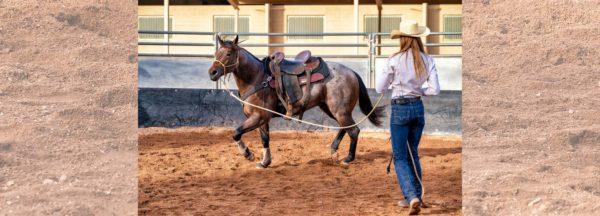Training Tip: Horse Bolts During Lunging

Question: I have a 5-year-old Mustang mare that was unhandled until last fall when I got her. We are working on the Fundamentals. Things were going great in the roundpen, so I decided to start lunging on the lunge line outside of the roundpen in my unfenced arena. The problem I’m having is the mare is looking away from me at times while lunging. On the second day, she bolted at a dead run straight away from me so fast I couldn’t correct her and she ripped the rope out of my hands. She quickly figured out she had the advantage and did it three times in one day. She does not do this in the roundpen. How can I correct this? – BriarRose
Clinton’s Answer: It’s difficult to tell by the way your question is worded if you’re following the Fundamentals Series exercises in order or if you’ve done the Roundpenning and then decided to go straight to Lunging for Respect. If you’re not following the exercises in order, go back and do that and make sure your horse can do each one well before you move on.
There are nine exercises between Roundpenning and Lunging for Respect, including Yielding the Hindquarters, Backing Up, and Yielding the Forequarters—exercises that are the foundation for all the other exercises in the Method. I’ve put the exercises in the order that they’re in for a reason—they set the horse up for success and each one builds off the other.
If you are following the Fundamentals exercises in order and are having this problem, here are a few things to do. First, be sure you’re not letting her get too far away from you. When you’re doing the exercise, the end of the lead rope should just be touching the ground. Horses will take advantage of you if you let them get too far out on the line because it’s easy for them to speed up and ignore you when you ask them to yield their hindquarters.
Holding the rope this way also gives you more leverage if the horse does take off. If you’re already at the end of the lead rope, you won’t have as much leverage to get her to stop and face you with two eyes.
Second, don’t let her go around the circle with her head tipped away from you. Where a horse’s eyes go is where his attention goes. So if she’s looking out of the circle, she’s not thinking about what you’re asking her to do. When she first did this, you should have bumped on the halter and lead rope to get her nose tipped to the inside of the circle. With repetition, she would have learned to arc her body around you in the circle.
Not only is it important to have your horse looking at you and her attention on you, but when a horse tips their head away from you, it’s easy for them to use their hindquarters to drive away from you. Your mare has figured this out. She knows what the game is. Horses are stronger than humans, but unless you tell them, they don’t realize it. Your mare knows, and now that she’s gotten into the habit of ripping the lead rope out of your hand, it’s going to be difficult to fix. Every single time she jerks that lead rope out of your hand and runs away, you’re just reinforcing to her that she’s stronger than you. The more times a horse gets away with a bad habit, the longer it takes to correct it.
Since your mare has gotten into the habit of jerking the lead rope out of your hand, as soon as she goes to look away from you, get two eyes NOW! Act as if you’re trying to pull her head off her neck (I’m not literally telling you to do that of course—I’m just planting an image in your mind). As soon as she turns and faces you with two eyes, release the pressure. You want to wake her up and make it clear to her—looking away from you is not acceptable.
This mare is a convicted felon – she knows exactly what she’s doing – so as soon as she looks out of the circle, get her attention now. Don’t make the mistake of letting her go around half a circle or an entire circle with her head tipped to the outside. She’s proven to you what she’s going to do—she looks out and then she bolts.
You may even try using a bridle with mecate reins instead of the halter and lead rope. That’ll give you more leverage to pull her off her feet and face you. You may even have to ask someone who is stronger than you to help you out.
Then, once you’ve gained her respect and have gotten control of her feet, you can back off and practice the exercise as you normally would.
Have a horsemanship question or looking for more training tips? Check out the No Worries Club.
